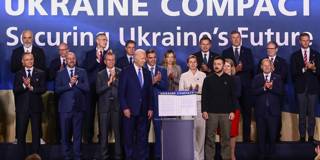There is good reason to think that, even if Russia and Ukraine reached a peace deal, Vladimir Putin would readily abandon it and re-invade Ukraine at the first opportunity. That is why any agreement must include a guarantee from NATO to protect Ukraine’s independence in the long term.
CHICAGO/KYIV – Last month, yet another NATO summit concluded with a vague statement that Ukraine will, at some point, be a member of the alliance. But while it is impossible to provide a precise date for Ukraine’s accession while the country is at war, the event that should trigger it should be clear: the United States and its NATO allies should stand ready to provide full protection to Ukraine as soon as a peace deal is reached. This would enable and encourage Ukraine’s government to make the difficult choices that are needed to bring an end to the fighting.

CHICAGO/KYIV – Last month, yet another NATO summit concluded with a vague statement that Ukraine will, at some point, be a member of the alliance. But while it is impossible to provide a precise date for Ukraine’s accession while the country is at war, the event that should trigger it should be clear: the United States and its NATO allies should stand ready to provide full protection to Ukraine as soon as a peace deal is reached. This would enable and encourage Ukraine’s government to make the difficult choices that are needed to bring an end to the fighting.